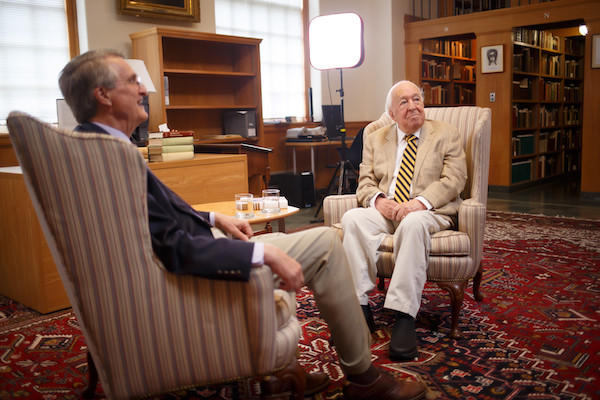DURING MY YEARS as an undergraduate student at Wake Forest, I knew Ed Wilson only through his prominent duties at programs such as convocations and Commencement. During my third year of law school this changed as I came to know Dr. Wilson while assisting President James Ralph Scales. In the fall of 1979, after I began working at Wake Forest, a regular pattern began of lunches, meetings and trips to away ball games together (often with the Wilson children). Later on, there was a good number of group trips with him to Europe, and we continued meeting regularly for lunch or cheese nachos. I am deeply honored and grateful to have been his friend across these decades.

Edwin Graves Wilson — We could not be who we are without his being who he was.
Lover of family, beauty, language, literature, art, movies, music, history; lover of Wake Forest, of people and of life. How do we express our gratitude for this man whose legacy and words inform the highest ideals that Wake Forest proclaims today? How do we honor this man who inspired us to be our better selves and to understand what is worth living for? How do we remember this man whose joyful life gave us the confidence to believe that the price we might have to pay for our principles would be worth it? How can we firmly settle in our minds, now that he is physically gone, the lessons that he taught so well, and go on, knowing that we have been his worthy students?
Certainly, his own words can help us.
My mind goes back to a trip he and I made alone to a football game at Duke in the ’80s. He drove, and we talked about everything going to and from. On the way over we got into a conversation about his job as provost, which was not a usual topic. I knew that as dean of the College beginning in 1960 and provost since 1968, he had interviewed almost all current faculty members before they were appointed. And so I asked him a question, trying to understand how he had translated his ideals into the selection of faculty: “Dr. Wilson, what is the most important single quality in a faculty member?” He answered quickly: “To serve others above themselves.” I needed no follow-up.
On another occasion, though I was not there at the Homecoming banquet in 1978, Dr. Wilson made a speech that must rank among the greatest ever given at Wake Forest. Some of you will remember the controversy with the Baptist State Convention of North Carolina that arose in the ’70s and culminated in Wake Forest’s separation from the convention in 1986. In 1978, the first question was whether Wake Forest would remain an “agency” of the convention, and the second question was what would Wake Forest be without the convention — what was our institution’s independent identity?
Dr. Wilson answered the latter question in a way that not only provided answers for that moment, but also became a ringing, timeless statement of the essence of our motto. The ideal of Wake Forest, he said, was “to stand up ‘for humanity’ in all its diversity and richness, to be a place of learning which men and women of goodwill everywhere might, if they knew it, be happy to call home.”
He went on to say that his strong hope was “that Wake Forest will continue forever to be what it was when I first saw it almost 40 years ago and what it is today: a place where reason, imagination and faith flourish, a place eternally and fearlessly in pursuit of the truth, a place which is open, hospitable, generous, loving, and free.”
Through his words we learned great truths. Through his joy we made them our own.
Reid Morgan (’75, JD ’79, P ’14, ’19) retired last year as University senior vice president and general counsel. He served four presidential administrations at Wake Forest, starting in 1979. He will be completing his role as secretary of the board of trustees at the end of June.


